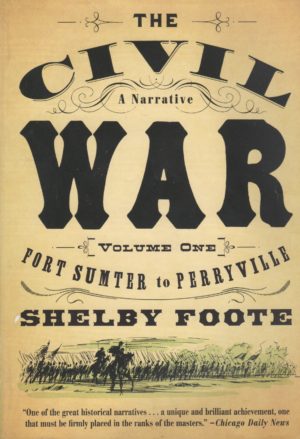
The title is in reference to fellow Denfeld High School and UMD grad (and lifelong pal) Dave Michelson. Dave handed me this ginormous trilogy written by historian Shelby Foote, the basis for Ken Burn’s wonderful PBD documentary, and said: “You need to read this.” I took the ten pounds of books from Dave and, awhile back, started on volume 1. You know what? Dave was right.
Yes, there’s a lot of information in the first book of this set. Yes, at times, Mr. Foote brings a reader maybe too far into the weeds of policy and military strategy and politics on both sides of the Mason-Dixon Line. But all in all, his prose is innately readable, his research is impeccable, and his fairness, in critiquing the issue of slavery and his native South’s reliance upon it as the engine for its agrarian economy, is balanced. Foote makes no excuses for his Southern ancestors’ sins and casts no fault on Lincoln’s evolution from reluctant supporter of buying slaves from their masters to free them to full-on emancipator, the devil be damned. But because of his heritage, Foote does bring keen insight into how the leaders of the Confederacy, especially Jefferson Davis, viewed Lincoln, the abolitionists, the Republican Party, and the North as the two sides sent boys and men to their deaths to prove principles held dear to each side. For Lincoln, it wasn’t slavery that prompted him to act: It was the threatened dissolution of the union, caused by the continual disagreement over slavery, its existence and its expansion, the made him bring the terrible power of the North’s industrial base and its larger population to bear in a war between (literally, in many of the border states) brothers.
Foote’s use of extensive first-person accounts, excerpted from primary source materials, is reminiscent of the way I structured my one and only foray into this sort of nonfiction, Mr. Environment: The Willard Munger Story, a biography of my legislator uncle and mentor. Don’t get excited here, folks: I’m not equating my abilities as a researcher, historian, and interviewer to the great Mr. Foote. But I was struck, when reading this first installment, by the similarity of Mr. Foote’s approach with my own attempt to recount my uncle’s life. Granted, Shelby has sold a hell of a lot more copies of his books than I have of all of mine combined. Still, I think there is a connection in terms of style and reportage that can’t be ignored.
My only criticism of the book ( and I’ve heard the same said about Mr. Environment) is that the narrative, at times, suffers under the weight of detail. That said, I’m looking forward to cracking open volume 2 of this massive history in hopes of continuing to learn.
4 stars out of 5. A well-written and researched, fair-handed treatment of a conflict that still haunts us today.
Peace.
Mark


